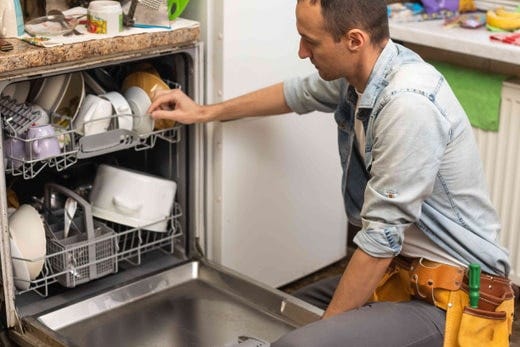
Warning Signs Your Dishwasher Is in Need of Repair

The dishwasher is one of the most used and vital appliances in the kitchen. It is the unsung hero who continuously keeps your plates sparkling clean while saving you time and money.
But what do you do when the dishwasher starts to show signs of wear or malfunction? With so many different dishwasher brands and models available, understanding the warning signs that your dishwasher is in need of repair is crucial.
We’re sharing the most common warning signs to alert you that your dishwasher needs repair. Keep reading to find out!
1. Dishes are dirty even after the wash cycle
If your dishwasher isn’t performing the primary task it was created for initially, then there’s something really wrong with it. However, there is no reason to replace your appliance.
If the dishes are still dirty even after the wash cycle, it could mean one of the two scenarios. In the first case, you are probably rinsing off your dishes too well — modern dishwasher detergents do not require one to rinse their dirty dishes, as the detergent is designed to break down the stuck-on food, grease, and stains.
In the second scenario, a blocked drain screen can also cause dishes to come out dirty. Food particles are left in the bottom after the last wash cycle due to the clogged drain.
The water blows these particles around on the next cycle, and they end up sticking to the dishes. If this is the case, you’ll need to unclog the dishwasher or have a repair specialist replace it with a new one.
2. Water will not pump into or out of the dishwasher
Modern dishwashers are equipped with sensors and water pumps that signal the internal computer when to pump water in and out.
However, if these sensors malfunction due to dirt, being stuck, or breaking, they must be repaired to avoid disrupting the washing process or causing the dishwasher to overheat.
Similarly, if the water pump fails, it requires replacement to ensure proper functioning. These repairs typically necessitate the expertise of a plumber as they involve disassembling the dishwasher to address the faulty parts of the dishwasher.
When encountering such issues, it's crucial to act promptly and seek professional help to prevent costly damage to the internal components.
3. Water is leaking from the dishwasher
If you ever notice water leaking from your dishwasher during a wash cycle, it's a clear indication of a problem that needs immediate attention.
Some of the most common issues could be a worn-out door seal, a clogged pump, a damaged seal, a misaligned door, or a blocked filter, which may need replacement to prevent further leaks.
Before seeking professional help, it is also advisable to check for any dishes pressing against the door, as this pressure could contribute to water seepage onto the kitchen floor.
4. Dishes are not hot after the wash cycle
A crucial aspect of dishwasher functionality is its ability to use hot water for thorough cleaning and sanitization.
When you find that your dishes are not hot to the touch after a wash cycle, it suggests a possible issue with the heating coil or insufficient power to heat the water adequately.
This is a clear indication that your dishwasher requires professional attention to diagnose and resolve the heating-related problem.
Whether the dishes are merely warm or cool post-cleaning, it signifies that the dishwasher isn't heating water effectively, compromising its cleaning performance and necessitating repairs.
5. Extended wash cycles
If you notice your dishwasher taking increasingly longer to complete a regular load or needing multiple cycles, it could signal underlying issues with either the thermostat or heating element.
To get the best performance out of your dishwasher, you will need to know what cycles and programs are available and which ones you should be using with every wash.
.png?width=70&height=45&format=png&quality=50)


